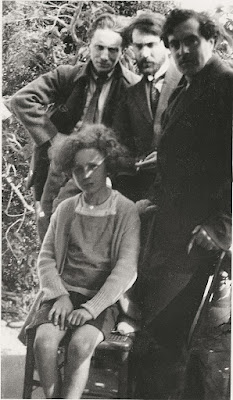CONTROL
LOVE WILL TEAR US APART: CONTROL directed by ANTON CORBIJN (2007)
This film retrospectively summarises the late ‘70s period after the impact of Punk Rock and the Sex Pistols and before the advent of Thatcherism. It is nostalgically filmed in black and white, underlining the bleakness of the northern setting (Macclesfield in Cheshire). Ian Curtis emerges as lead singer of band Warsaw which then transforms itself into Joy Division. Curtis is a self-absorbed, narcissistic youth dreaming of pop and poetic fame. He comes across as insecure, arrogant, selfish and individualistic. In short, all the needful qualities in his chosen profession.
The period is summarised brilliantly but the film is bleak and painful to watch, as Curtis fails to cope with success, relationships and epilepsy. He’s depicted as helpful and conforming too. The band is tinged with fascism, as Joy Division refers to a special division of comfort women in WW2 (depicted in the novel The House of Dolls by Yehiel De-Nur). Curtis’ lugubrious voice, emaciated figure, bleak lyrics seem to hint at fascism or perhaps there is a deeply embedded Gothic quality instead.
Curtis’ relationship with his wife Debbie is failing as he begins to tour with the band on the continent, meeting and beginning a relationship with a Belgian rock journalist. It seems that Debbie reminds him of everything that he wants to escape from, all the depressing mundanity and ordinariness of Macclesfield, marriage and the awfulness of marriage and children there. The band sign with Tony Wilson of Factory Records, and eventually end up with a bigger deal, a tour of America.
Curtis isn’t depicted as a saint. At times he seems more than intellectually naïve, as when he goes to the cinema to see Apocalypse Now by Francis Ford Coppola, writing in his diary about the struggle between the conscience and the heart of Kurtz. He’s impressed by Kurtz reading the T.S.Eliot poem ‘The Hollow Men’ and by the disintegration of Kurtz’s moral, personal standards depicted in the film.
There’s no doubt that Control will come to be seen as on a par with that film. The film regards the music industry as a rollicking, piss take of a world but one with definite casualties. Curtis was one of those. But the history of literature has this to say: in general terms, only mediocre novelists and poets commit suicide in their youth. Thomas Chatterton was one of those, a competent forger incapable of really original creative endeavours. Curtis’s suicide was a cry for help but also a confession of weakness.
Paul Murphy, Odeon Panton Street, London
This film retrospectively summarises the late ‘70s period after the impact of Punk Rock and the Sex Pistols and before the advent of Thatcherism. It is nostalgically filmed in black and white, underlining the bleakness of the northern setting (Macclesfield in Cheshire). Ian Curtis emerges as lead singer of band Warsaw which then transforms itself into Joy Division. Curtis is a self-absorbed, narcissistic youth dreaming of pop and poetic fame. He comes across as insecure, arrogant, selfish and individualistic. In short, all the needful qualities in his chosen profession.
The period is summarised brilliantly but the film is bleak and painful to watch, as Curtis fails to cope with success, relationships and epilepsy. He’s depicted as helpful and conforming too. The band is tinged with fascism, as Joy Division refers to a special division of comfort women in WW2 (depicted in the novel The House of Dolls by Yehiel De-Nur). Curtis’ lugubrious voice, emaciated figure, bleak lyrics seem to hint at fascism or perhaps there is a deeply embedded Gothic quality instead.
Curtis’ relationship with his wife Debbie is failing as he begins to tour with the band on the continent, meeting and beginning a relationship with a Belgian rock journalist. It seems that Debbie reminds him of everything that he wants to escape from, all the depressing mundanity and ordinariness of Macclesfield, marriage and the awfulness of marriage and children there. The band sign with Tony Wilson of Factory Records, and eventually end up with a bigger deal, a tour of America.
Curtis isn’t depicted as a saint. At times he seems more than intellectually naïve, as when he goes to the cinema to see Apocalypse Now by Francis Ford Coppola, writing in his diary about the struggle between the conscience and the heart of Kurtz. He’s impressed by Kurtz reading the T.S.Eliot poem ‘The Hollow Men’ and by the disintegration of Kurtz’s moral, personal standards depicted in the film.
There’s no doubt that Control will come to be seen as on a par with that film. The film regards the music industry as a rollicking, piss take of a world but one with definite casualties. Curtis was one of those. But the history of literature has this to say: in general terms, only mediocre novelists and poets commit suicide in their youth. Thomas Chatterton was one of those, a competent forger incapable of really original creative endeavours. Curtis’s suicide was a cry for help but also a confession of weakness.
Paul Murphy, Odeon Panton Street, London

Comments